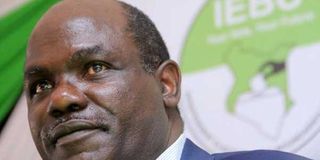Great lessons from polls, post-election analysis urgent task

IEBC Chairman Wafula Chebukati. He breathed a sigh of relief at the end of one of the most bitterly fought presidential contests between Uhuru Kenyatta and Raila Odinga. PHOTO | JEFF ANGOTE | NATION MEDIA GROUP
What you need to know:
For Chebukati, the shadow of an annulled poll will always haunt him.
The electoral cycle revolves around three main areas – the pre-electoral period, the electoral period and the post-electoral period.
2018 will be the year of transforming the institution to make it more responsive and sustainable.
The Independent Electoral and Boundaries Commission (IEBC) boss Wafula Chebukati breathed a sigh of relief at the end of one of the most bitterly fought presidential contests between Uhuru Kenyatta and Raila Odinga.
He has told some of his close friends that he is happy to reclaim his life after literally knowing no sleep for months although the shadow of an annulled poll will always haunt him.
Q: When are you commencing post-election evaluation?
A: Electoral management bodies work around what has come to be known as the electoral cycle. It is a practice that sees elections as continuous processes rather than isolated events. The electoral cycle revolves around three main areas – the pre-electoral period, the electoral period and the post-electoral period. We are now in the post-electoral period where we are preparing for Post-Election Evaluation. This will be the first task in the New Year.
The report, which we will make public, will hopefully help bring clarity to some of the issues that we may not have had the opportunity to clarify and therefore unfortunately contributed to a poor people’s trust in the institution. We have planned nine clusters of country workshops that will bring together all stakeholders, key among them political parties. Each cluster will give a report to the national workshop in May, 2018. There is a technical working committee and it will entail focus group discussions etc.
Q: What are the likely areas of focus?
A: The review will be in all areas of an election process – legal, voter registration, voter education, electoral technology, costs, financing, procurement and communication. The Commission is keen to understand the effectiveness of its operations and the voter experience in the electoral process – what worked well and what could have been done better. I expect the outcome to be incisive and candid.
Q: Lessons from August 8 and October 26?
A: There are certainly profound lessons from the two polls we held this year. But let’s not pre-empt matters because the post-election evaluation will certainly point out the real issues. It is only when we have the views of all players on board that we can truly say we have a reflection of the exercise. I will have my input in it.
Q: When is the process on delimitation of boundaries beginning?
A: The boundaries review is undertaken every 8 to 12 years as per article 89 of the Constitution. The next cycle of review starts this year, 2018, and should end by 2021, a year to the General Election. The Commission has been engaging stakeholders in a bid to resolve issues arising from the 2010-2012 review of boundaries. We will engage the public at constituency and ward levels to create awareness and better understanding on boundary delimitation. It can be an emotive issue and everything must be done to ensure it does not polarise communities.
Q: The commission must have spent a fortune in legal fees arising from many poll petitions. How much have you spent on the cases including the two presidential petitions?
A: The Commission had reviewed, harmonised and capped legal fees by the repeat presidential poll of 26th October, 2017. They are in line with the advocates’ remuneration order. The cases are going on and details of the costs will be available on completion of the petitions.
Q: What is in your agenda for 2018?
A: As mentioned earlier, the immediate task we are undertaking is the post-election evaluation. 2018 will be the year of transforming the institution to make it more responsive and sustainable. We will be working to meet our financial obligations, to settle our pending bills and so on.
Top on the agenda will also be strategies for cost containment.





